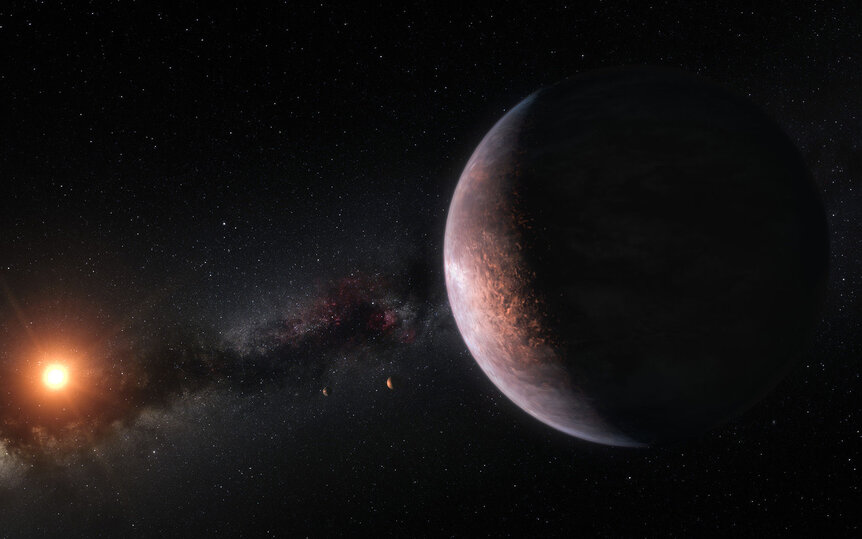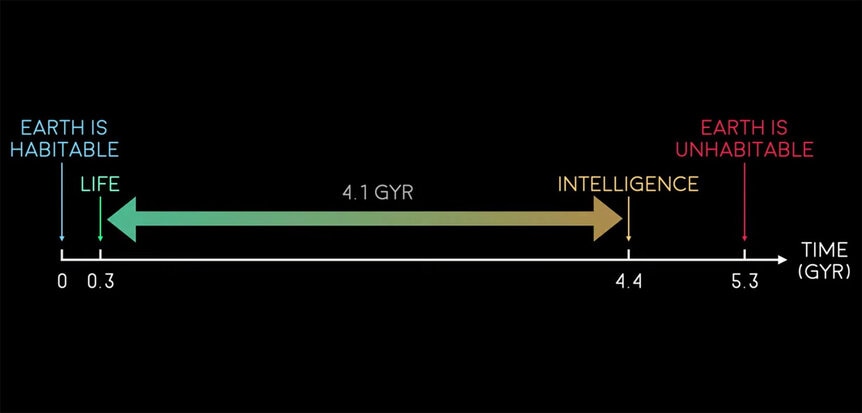Create a free profile to get unlimited access to exclusive videos, sweepstakes, and more!
Do aliens exist? Probably. Are they intelligent? Probably not.

Are we alone?
That's a big question. Huge. It's one of the biggest philosophical concept there is: Is there life elsewhere in the Universe?
Moreover, is there intelligent life? I'd be thrilled beyond measure if we saw the signature of, say, chlorophyll in the ice of Europa, but finding phytoplankton is a long way from having someone to talk to.
I've been asked if I think life exists elsewhere, and my answer is always that I do. This is based upon a single fact: Life got a toehold on Earth very rapidly after the planet formed, just a few hundred million years. That implies that it's easy for life to arise (a process called abiogenesis, life from non-life), because it happened so quickly as soon as conditions for it on Earth were present.
But we really don't know that. Maybe life usually takes billions of years, and we were lucky. We only have our one example of life arising and so it doesn't really tell us anything about how easy it is. All it tells us is that the chances of it happening are not 0.
A new study using a sophisticated form of statistical analysis shows that life is actually quite likely to arise if conditions allow it. Hurray! However, it also shows intelligent life is far less likely. Boo.
As I said, my assumption about the probability of life arising is flawed, since we don't really know the odds. Worse, we're biased; because it happened to us we think that's the case everywhere. There's also another bias in our thinking: We're here and intelligent, and therefore life must have arisen before us (this is called the Weak Anthropic Principle: We're here, therefore conditions must be right for us to exist). It's a preexisting condition, needed for intelligence to arise. That's almost a tautology, but it does affect our thinking.
So given this, how do we decide what factors are important and figure this out?
A couple of scientists tried to work this out using a type of math called Bayesian statistics. It's different than normal statistics, in that it allows for prior knowledge to be used in the calculation, and allows you to learn from it the next time you run the math. So, say, if you ask the odds of a coin flip being heads, you'd say 50/50. But if you know the coin is slightly off-balance, and that tips the odds, you can use Bayesian methods to find out what your best bet would be. Flip the coin again, and you can use the results to feed back into your system.
In this case, the prior knowledge we have is how long it took life to arise. But they found that when they ran their calculations, changing the prior assumptions strongly influenced their result, giving wildly different answers. That's frustrating.
Astrophysicist David Kipping — about whom I've written before; he's looking for exomoons orbiting exoplanets — decided to tackle this. He started with the same methodology as the previous study, but added in two factors. One is that he took into account how long it takes for intelligence to arise once life exists. That turns out to be important, because we don't have infinite time! Right now, the Sun is slowly warming (over very long timescales; climate science deniers please spare me your spittle-flecked comments). In about the next 900 million years, the Earth will get too warm for life like us to arise. That limits how long life can take to arise.
His second assumption is more subtle. The previous study assumed the probability of life arising is flat: It could be 0, or 1 or anything in between. But that's not how physics usually works. Usually, a process either never works or it always does. Simplistically, if I drop a rock it always falls down. It never falls up. The probability of it falling is always 1, and the probability of it flying away is 0.
So Kipping skewed the probability function of life arising at all in his calculation to values near 0 and 1. He also limited his math using some real numbers; the earliest life could've arisen on Earth is 4.1 billion years ago (based on analysis of carbon locked in minerals called zircons). The latest is 3.465 billion years ago, based on microfossils found in Australia. Also, he used the "habitability window" of how long Earth is actually habitable (about 5.3 billion years), and how long it took intelligence to arise (you can argue over what that means, but the timescale between hominins evolving to today is short compared to the time Earth has been around, so it doesn't matter much what you pick). Those last two are important, because the fact that we evolved intelligence near the end of the Earth's window means it likely takes a long time to arise.
Kipping describes all this in a series of tweets:
[Click that to see the whole thread.]
He also made this wonderful video about all this. It's about a half hour long, but well, well worth your time to watch:
And what did he get?
He found that if you turn back the clocks on Earth, rerun the physics, then conservatively the odds of life arising quickly are about 3:1 in favor over it taking a long time. Using the earlier date from zircons, the odds rise to about 9:1! That's pretty good. It doesn't mean life will arise quickly every time, just that it's much more likely to.
What about intelligence? Assuming life arose quickly, the odds of intelligent life evolving are actually slim. Looking at whether the probability is very close to 0 (meaning extremely rare intelligent life) or 1 (very common), Kipping's work favors the low probability at odds of just 3:2. In other words, it's more likely intelligent life is extremely rare. That's due mostly to how long it took to develop after life arose, and how long the Earth's habitability window is and that we're near the end of it.
What does this mean in the Universe we live in? Well, you can't extrapolate these results to other planets, since we don't know what specific conditions they have. But if you like to gamble, it implies that the best bet is that life is common, but intelligence is rare.
That's interesting! We don't see any evidence for life or intelligence out there, but right now intelligence is probably easier to spot (assuming intelligence leads to technology which in turn leaves clues that it exists). Not seeing life doesn't imply much — planets covered in bacteria or yeast could be common, but we just don't have the ability to see that yet. But not seeing evidence of technology is a little more worrisome, given that under many circumstances we can detect it. Kipping's results are consistent with that.
Note the word consistent. He hasn't proven anything, because that's not how this kind of probability works. He's just shown that, given these assumptions, life is likely to be common and intelligence rare. Even then you have to be careful because maybe some planets have a much longer habitability window, and some shorter.
There's still a long way to go in this exploration; this is still an early shot at it. But it's encouraging. If life is common, that's amazing. And if intelligence is rare, well then, that tells us how precious and fragile our species really is.
If these results tell us anything, it's that we need to take care of ourselves. We must foster what we have, nurture it. After all, in 900 million years we'll have a big decision to make.




























